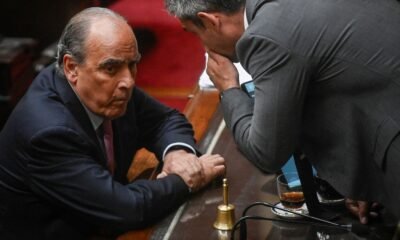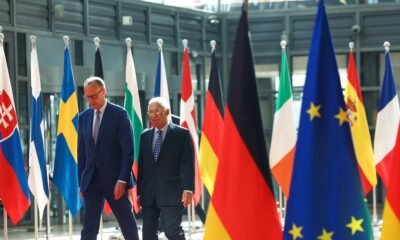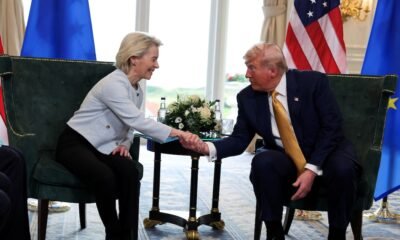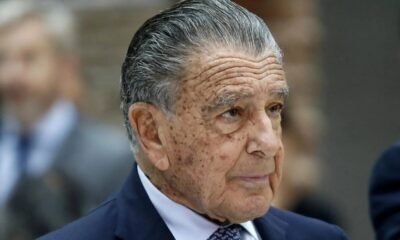INTERNACIONAL
Crecen las tensiones internas en Europa tras el acuerdo comercial con Estados Unidos: caen el euro y las bolsas

El acuerdo comercial entre la Unión Europea (UE) y Estados Unidos que evitó una guerra comercial ha generado una fuerte división en Europa, con mercados financieros que reflejan la inquietud por un pacto considerado desequilibrado por varios países del bloque.
El euro cayó un 0,8% frente al dólar este lunes, mientras que las principales bolsas europeas registraron descensos.
París perdió 0,1%, Fráncfort retrocedió 0,6% y Londres cayó 0,4%, borrando las ganancias iniciales de la jornada.
En contraste, los mercados estadounidenses mostraron señales mixtas, con el Dow Jones abriendo en terreno negativo (-0,1%) mientras el S&P 500 avanzó 0,1% y el Nasdaq tecnológico extendió su tendencia alcista con un alza del 0,3%.
La Comisión Europea defendió este lunes el pacto sellado el domingo entre Trump y la presidenta de la Comisión, Ursula von der Leyen, que establece un arancel del 15% sobre la mayoría de productos europeos exportados al mercado estadounidense. El acuerdo también incluye compromisos de la UE para comprar energía estadounidense por 750.000 millones de dólares y realizar inversiones adicionales por 600.000 millones de dólares.
“Estoy 100% seguro de que este acuerdo es mejor que una guerra comercial con Estados Unidos”, declaró Maros Sefcovic, comisario europeo de Comercio y principal negociador de la UE. Sin embargo, esta posición oficial contrasta con las críticas que han surgido desde diversas capitales europeas y sectores industriales.
Las críticas más duras provinieron de Francia, donde el primer ministro François Bayrou describió el acuerdo como una capitulación ante el poderío estadounidense. “La UE se sometió a Estados Unidos con ese acuerdo”, declaró Bayrou, calificando la jornada como “un día sombrío” para Europa que “se resigna a la sumisión”.
Esta posición francesa refleja las tensiones internas dentro del bloque europeo sobre cómo manejar las presiones comerciales de la administración Trump. Madrid también había presionado para que la UE adoptara una línea más dura contra Washington, aunque el primer ministro español Pedro Sánchez finalmente expresó su apoyo al acuerdo “pero sin ningún entusiasmo”.
Sánchez, quien lidera el gobierno de izquierda español, señaló que la situación era un recordatorio de que “los europeos necesitamos ponernos las pilas en todas las áreas”, incluyendo el desarrollo de relaciones comerciales con otros países.
En contraste, la primera ministra italiana Giorgia Meloni recibió “positivamente” el acuerdo, argumentando que “una escalada comercial entre Europa y Estados Unidos habría tenido consecuencias imprevisibles y potencialmente devastadoras”. Durante una visita oficial a Etiopía, Meloni calificó el nivel arancelario del 15% como “sostenible”, aunque pidió a Bruselas que prepare un plan de apoyo para las industrias europeas más afectadas.
Meloni también señaló que aún quedaban detalles críticos por definir, incluyendo posibles exenciones agrícolas a los aranceles. Sin embargo, líderes de la oposición italiana han atacado el acuerdo y señalado que la deferencia de Meloni hacia Trump fue parcialmente responsable del resultado.

en abril (REUTERS/Evelyn Hockstein)
El canciller alemán Friedrich Merz también defendió el pacto, afirmando que “evita una escalada inútil” en los aranceles al intercambio comercial. El gobierno alemán, a través de su portavoz, reiteró su apoyo a la Comisión Europea, aunque reconoció que debían “reconocer las realidades en las que opera la política”.
La ministra de Economía alemana, Katherina Reiche, describió el acuerdo como “desafiante para nuestra economía, pero proporciona certidumbre”, destacando que algunos sectores habían sido excluidos tras un trabajo arduo de negociación.
Los líderes de extrema derecha en Francia y Alemania también arremetieron contra el acuerdo. Alice Weidel, co-líder de Alternativa para Alemania (AfD), escribió en la plataforma X que el acuerdo “no es un acuerdo, sino una bofetada a consumidores y productores europeos”.
El primer ministro húngaro Viktor Orban fue particularmente mordaz en sus críticas, comparando desfavorablemente el acuerdo de la UE con el logrado por Reino Unido, que aseguró aranceles del 10% sobre la mayoría de importaciones a EEUU. “No es Trump quien llegó a un acuerdo con Ursula von der Leyen, sino más bien Trump quien se comió a Ursula von der Leyen como desayuno”, declaró el dirigente ultraconservador húngaro.
Incluso el ministro de Relaciones Exteriores ruso, Serguéi Lavrov, estimó que el acuerdo representa un “golpe muy duro” a la industria europea, prediciendo que “este enfoque llevará a una mayor desindustrialización de Europa, a un flujo de inversiones de Europa hacia Estados Unidos”.
Los sectores industriales también expresaron preocupaciones. La Federación de Industrias Alemanas advirtió que el acuerdo era “un compromiso inadecuado” que dañaría la “industria orientada a la exportación” del país. La industria química alemana lamentó que los aranceles acordados todavía eran “demasiado altos”.

El sector siderúrgico europeo, representado por Eurofer, advirtió que el arancel del 15% añadiría una “enorme carga” a sus miembros, especialmente porque “muchas exportaciones de la UE son intensivas en acero, como maquinaria y vehículos”. El acero permanece sujeto a un arancel del 50% introducido por Trump anteriormente este año.
El principal núcleo empresarial francés apuntó que el acuerdo “ilustra la dificultad que todavía tiene la UE para afirmar el poder de su economía y la importancia de su mercado interno”.
Las empresas europeas reflejaron la inquietud por el acuerdo. Las automotrices alemanas Volkswagen, BMW y Porsche perdieron más de 3% cada una.
En el sector de bebidas, las acciones de Pernod Ricard, que exporta vinos y licores a Estados Unidos, cayeron más de 3% en París.
Los grupos políticos del Parlamento Europeo también han criticado duramente el acuerdo comercial, calificándolo de “delirante”, una “vergüenza” y una “capitulación” abierta.
“Imponer un arancel base del 15 por ciento es una flagrante violación de los principios de la Organización Mundial del Comercio y un duro golpe a la competitividad industrial europea”, declaró Jörgen Warborn, portavoz de Comercio del Partido Popular Europeo. El eurodiputado añadió que “en un momento de crecientes tensiones geopolíticas, un sistema comercial basado en reglas es más esencial que nunca para proporcionar predictibilidad a las empresas y a los ciudadanos”, por lo que “la UE no debe llevar a cabo ninguna acción que pueda socavar” este objetivo.
Desde las filas socialdemócratas, Brando Benifei, responsable de Comercio del grupo, señaló que el pacto cerrado por la Comisión Europea “ha obtenido peores condiciones” que las acordadas entre Reino Unido y Washington, país que abandonó la UE en 2020 tras el Brexit.
La presidenta de los liberales, Valérie Hayer, criticó que la UE esté pagando “un alto precio” por mantener “un superávit comercial de 50.000 millones de euros con Estados Unidos, resultado del mérito de nuestras empresas y de la calidad de su producción”. En un mensaje en redes sociales, Hayer escribió: “La lección de este acuerdo: somos un gigante económico pero un enano político. 27 países, 450 millones de consumidores, la segunda economía más grande del mundo. Una fuerza increíble. Y, sin embargo, a partir de este viernes, los productos europeos exportados a Estados Unidos se verán afectados por aranceles del 15%”.
El copresidente de los Verdes, Bas Eickhout, mostró particular preocupación por el compromiso de comprar productos energéticos estadounidenses por 750.000 millones de dólares. “Delirante parece ser un término preciso para definir el acuerdo comercial”, afirmó en redes sociales.
La crítica más severa provino de Manon Aubry, presidenta de la Izquierda Europea, quien escribió: “¡Qué vergüenza! La UE se está entregando a Trump y capitulando abiertamente: aranceles del 15%, 750.000 millones de dólares en compras e energía contaminante, 600.000 millones de dólares en inversiones en EE.UU.”.
Corporate Events,Diplomacy / Foreign Policy,Europe,TURNBERRY
INTERNACIONAL
Histórico juicio contra Álvaro Uribe en Colombia: «La justicia no se arrodilla al poder»
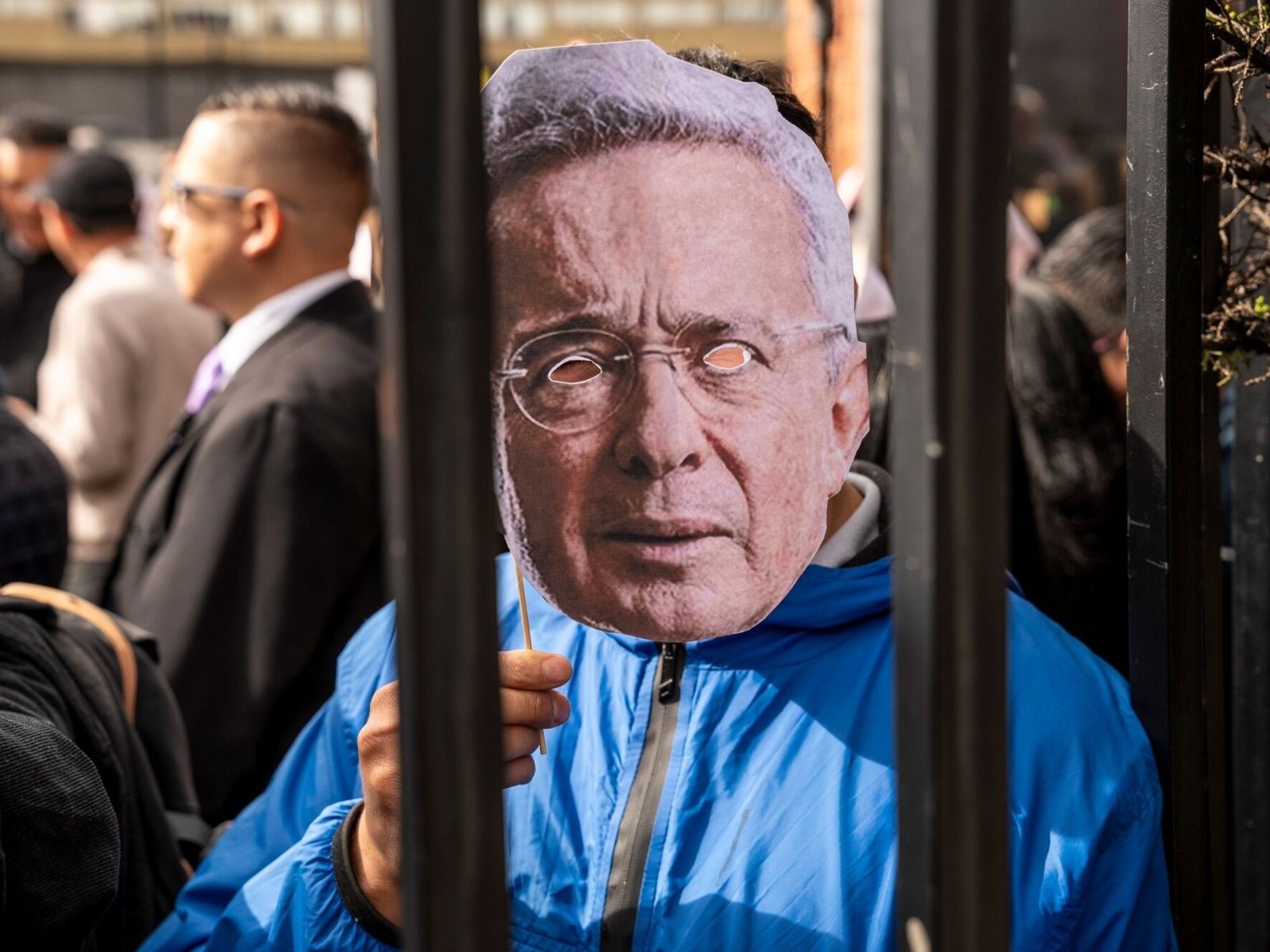
Las claves del «juicio del siglo»
INTERNACIONAL
Democratic Party tensions seep into bipartisan group as governors resisting Trump’s agenda reconsider dues
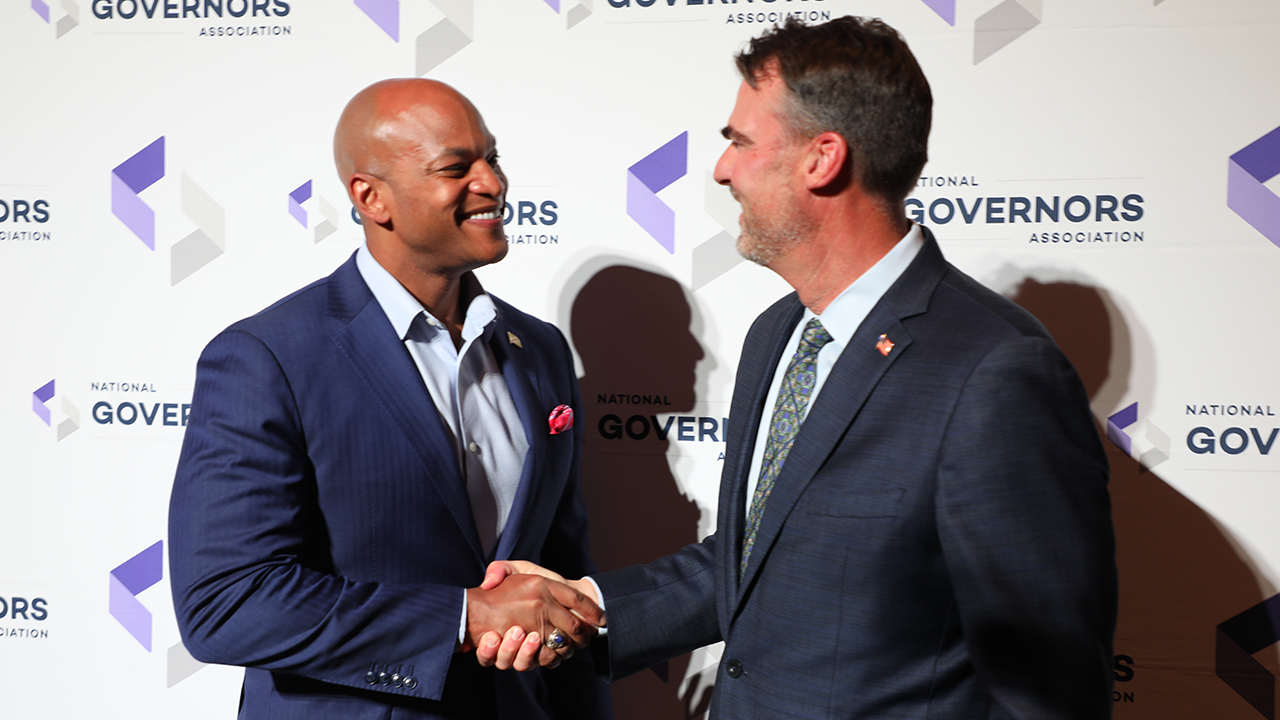
NEWYou can now listen to Fox News articles!
Colorado Springs, Colo. – A typically drama-free bipartisan meeting of the nation’s governors got off to a rocky start when The Atlantic reported ahead of the National Governors Association (NGA) summer meeting in Colorado Springs, Colorado, that some Democratic governors were considering withholding their dues, arguing that the NGA is not doing enough to reject President Donald Trump’s alleged impediment to states’ rights.
Chair of the Democratic Governors Association (DGA) Gov. Laura Kelly of Kansas will stop paying NGA dues starting next month, a source familiar with the governor’s thinking confirmed to Fox News Digital. The Atlantic reported that former DGA chair and failed vice presidential candidate, Gov. Tim Walz of Minnesota, is also considering stepping away from the NGA.
Gov. Wes Moore, D-Md., who became NGA vice chair this past weekend, told reporters on Saturday that some of the Democratic governors’ frustrations about the effectiveness of the bipartisan group are «justified.»
But a source familiar with the matter, who attended the summer meeting and was granted anonymity to speak more freely, told Fox News Digital, «You can’t blame a bipartisan organization for your lack of cohesive messaging.»
INCOMING NGA CHAIR ‘DISAPPOINTED’ IN DEM GOVERNORS ‘PLAYING POLITICS’ IN BIPARTISAN GROUP
National Governors Association (NGA) chair Gov. Kevin Stitt, R-Ok., (right) and vice chair Gov. Wes Moore, D-Md., shake hands following a media availability at the summer meeting in Colorado Springs, Colorado. (Deirdre Heavey/Fox News Digital)
Since losing the White House and Congress last year, Democrats have struggled to look to a new party leader and deliver a cohesive message.
While it’s clear that Democrats reject Trump’s agenda, infighting at the Democratic National Committee (DNC) and within the New York City mayoral race have exposed the party’s disagreements on how to effectively combat Republicans’ current political prowess.
TIM WALZ LEADING DEM EFFORT TO TURN BIPARTISAN GROUP AGAINST PRESIDENT TRUMP: REPORT
Democratic Gov. Jared Polis of Colorado led his final meeting as NGA chair this past weekend, passing the leadership baton to Republican Gov. Kevin Stitt of Oklahoma and incoming vice chair, Moore.
During a media availability to conclude the weekend, Moore, considered a potential 2028 presidential candidate, confirmed that he spoke with both of the Democratic governors who are casting doubt on the effectiveness of the NGA.
«They’ve expressed some of their frustrations, and frankly, I think some of the frustrations they have expressed are justified, because I do think it is important that this organization is never going to be either the cheerleader nor the heckler of a federal administration, no matter what the federal administration is,» Moore said.
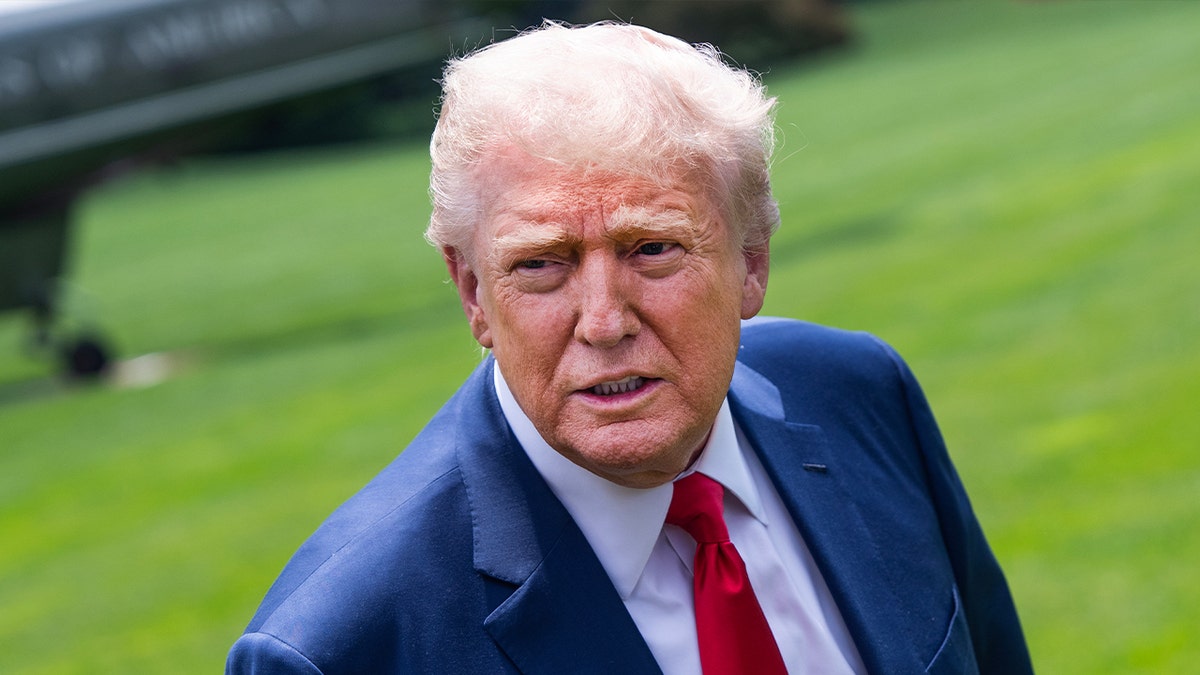
President Donald Trump arrives on the South Lawn of the White House from Camp David on Monday, June 9, 2025. (Tom Williams/CQ-Roll Call, Inc)
While he said it is not the job of the bipartisan NGA to support or reject the Trump administration, Moore said there are «certain things we want to make sure that the organization continues to uphold.»
Walz has not responded to Fox News Digital’s requests for comment on the reporting and has not issued a public statement explaining his disagreement with the bipartisan group.
A source familiar with Kelly’s thinking said the Kansas governor won’t renew her dues at the NGA this year because the organization hasn’t been upholding its mission statement to advance and protect states’ rights.
The source said Kelly doesn’t think the NGA is doing enough to stand up against the «dismantling of solutions-based governance, which is what the NGA claims to advance and push for.»
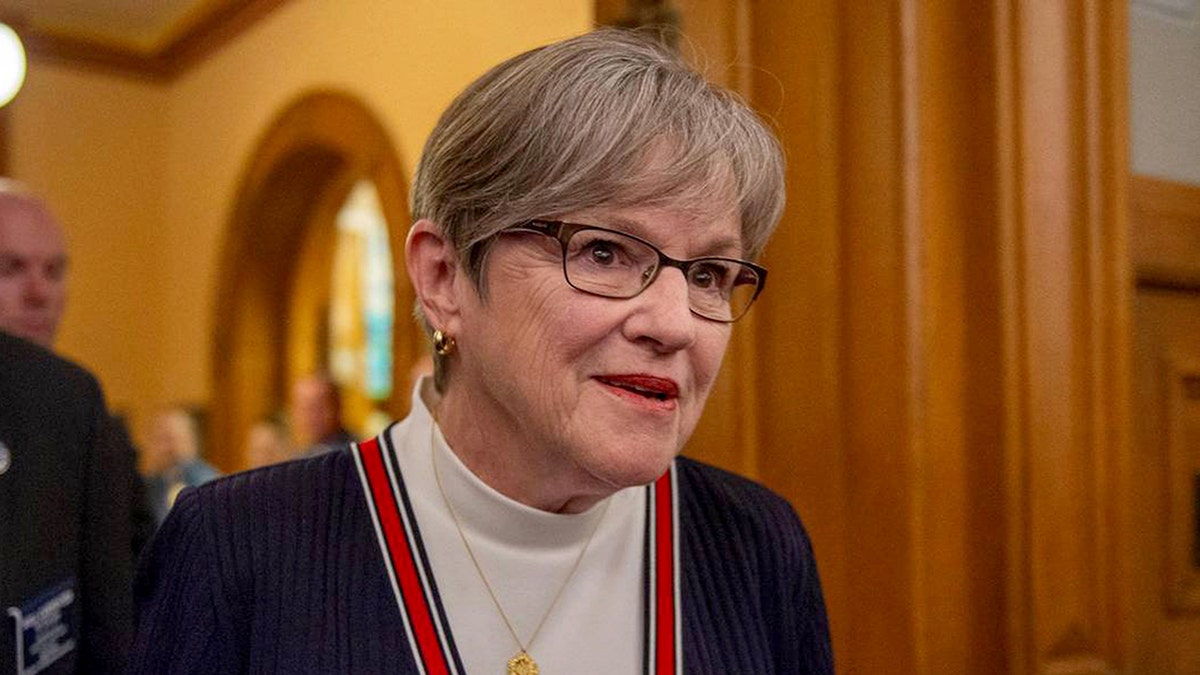
Kansas Gov. Laura Kelly enters the House chamber for the State of the State address at the Kansas State Capitol on Jan. 10, 2024, in Topeka, Kansas. (Emily Curiel/The Kansas City Star/Tribune News Service via Getty Images)
However, if the NGA were to demonstrate that «they are willing to stand up for states’ rights in this moment and show that it’s worth the use of taxpayer dollars,» then Kelly would be interested in reassessing Kansas’ membership, according to the source familiar with the governor’s thinking.
According to The Atlantic report, citing unnamed sources, Kelly and Walz thought the NGA «did not respond forcefully enough» when the Trump administration paused federal funding earlier this year, as Gov. Janet Mills of Maine clashed with Trump over biological men playing in women’s sports and, more recently, when Trump authorized the National Guard to California amid the anti-ICE protests.
But Eric Wohlschlegel, NGA communications director, countered, «Every public statement NGA issues reflects bipartisan consensus. So far this year, all but one statement has had that consensus, and when governors don’t agree, we simply don’t issue one. That’s how we preserve our role as a bipartisan convener, a principle we won’t compromise.»
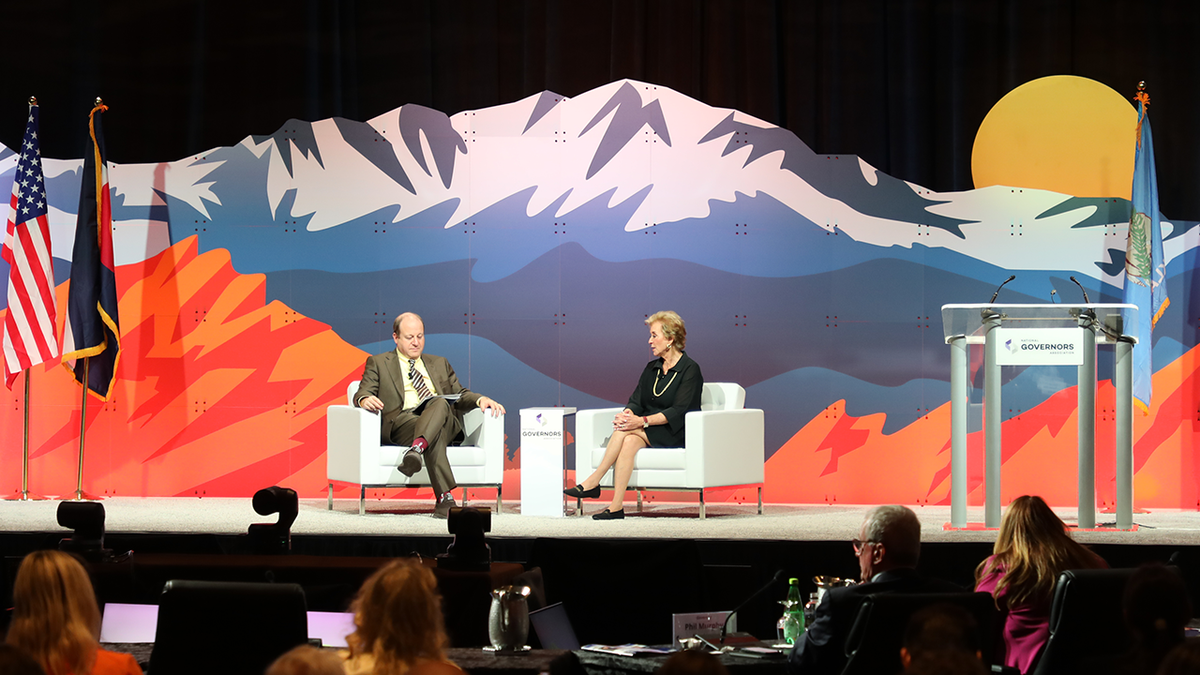
National Governors Association (NGA) outgoing chair Gov. Jared Polis discusses American education with Education Secretary Linda McMahon at the NGA Summer meeting in Colorado Springs, Colo., on Friday, July 25, 2025. (Fox News Digital / Deirdre Heavey)
The summer meeting featured discussions with two of Trump’s most controversial cabinet picks, Education Secretary Linda McMahon and Health and Human Services (HHS) Secretary Robert F. Kennedy, Jr.
Polis told reporters on Saturday that governors were most concerned about education and healthcare, so the cabinet members’ participation created an effective forum for the executives to address their questions and deliver for their states.
Wohlschlegel highlighted the bipartisanship on display at the summer meeting in a statement to Fox News Digital.
«After days of one-on-one meetings between governors and Education Secretary Linda McMahon during the conference, the department released over $5.5 billion it had been withholding from states. That’s not a coincidence, but the power of bipartisan leadership coming together to deliver real results,» he said.
Moore told reporters on Saturday that the NGA will continue to «show all of our colleagues the value add for them to be a part of the NGA» and the «hopeful goal for the NGA is also one where we can bring our friends back into the fold.»
Polis also confirmed he had spoken with the Democratic governors about their departure from the NGA, but he did not affirm their frustrations to reporters as Moore did.
«I think that it’s incumbent on the organization to show the value to the governors,» Polis added. «For me, it’s an easy decision. We get our value for our dues, and I am a more effective governor because of it, and that’s the way the vast majority of governors feel. Of course, there’s going to be a few on both sides of the aisle that don’t, and there always have been.»
The NGA has existed as a forum for bipartisan collaboration among governors since 1908.
«We shouldn’t be playing politics like they do in Washington, D.C.,» Stitt told Fox News Digital in an exclusive interview at the summer meeting. «But sometimes, if you’re a governor running for president or a higher office, you make it political.»
CLICK HERE TO GET THE FOX NEWS APP
«I would tell anybody, listen, do you want your leaders to take their ball and go home just because they get mad at something? That’s not the way to solve problems,» Stitt said, before adding, «Listen, this isn’t the time to take our ball and go home. Let’s sit down and debate what the best policies [are] going forward.»
Fox News Digital’s Peter Pinedo contributed to this report.
INTERNACIONAL
Iran more than doubles state executions in first half of 2025

NEWYou can now listen to Fox News articles!
Iran more than doubled the number of state executions it has carried out this year compared to data from the first half of 2024, confirmed the United Nations on Monday.
The UN Human Rights Office said that at least 612 people have been executed this year alone, a figure more than double the 297 people who were killed during the same time period last year.
Minority groups continue to make up a disproportionate number of those being killed by Tehran, confirmed the U.N.
Portraits of the Iranian youths that the Iranian regime has killed seen displayed at the rally in Paris, France on May 13, 2025. (Siavosh Hosseini/SOPA Images/LightRocket via Getty Images)
IRAN RAMPS UP STATE EXECUTIONS AMID NUCLEAR TALKS WITH US
«It is alarming to see the reports that indicate there are at least 48 people currently on death row – 12 of whom are believed to be at imminent risk of execution,» U.N. Human Rights Chief Volker Türk said on Monday.
The news of the drastically increased number of state executions comes just one day after Tehran killed Behrouz Ehsani and Mehdi Hassani on Sunday, both of whom were allegedly involved with the opposition movement known as the People’s Mojahedin Organization of Iran (MEK).
Maryam Rajavi, president-elect of the National Council of Resistance of Iran, a dissident group based in Paris led by the MEK, took to X to condemn the killings, and quoted the final words of Behrouz Ehsani: «We will never—under any circumstances—surrender to this bloodthirsty and criminal regime. Never shall we bow to humiliation.»
According to Amnesty International, «[both] were executed arbitrarily amid Iran’s horrific execution crisis.»
«Their executions highlight the authorities’ use of the death penalty as a tool of repression in times of national crisis to crush dissent and spread fear,» the group added.
More than 40% of those executed this year were convicted on drug-related offenses, while the U.N. also found that many were not only tried behind closed doors, but were issued vague charges like «enmity against God» and «corruption on earth» — both of which are apparently used by the regime to «silence dissent.»
«Information received by my Office also indicates that judicial proceedings in a number of cases, often held behind closed doors, have consistently failed to meet due process and fair trial guarantees,» Türk said in a statement.
IRAN EXECUTES OVER 1K PRISONERS IN 2024, HIGHEST TOTAL IN 30 YEARS, REPORT SAYS
The number of state executions has drastically escalated since President Massoud Pezeshkian took office in July 2024, with at least 975 people killed in 2024, the highest rate since 2015.
The U.N. body further warned that Iran is looking to expand its use of the death penalty and is reviewing a new espionage bill that will redefine what it considers «collaboration with hostile States.»
Acts including online communication and collaborating with the foreign media will apparently call into question their «ideological alignment» and will be punishable by death.
The changes come as Israel has called for a regime change in Tehran, and has repeatedly emphasized that the recent strikes were an attack against the government, not the Iranian people.

A woman is laying down flowers for the victims of executions in Iran during the rally in Paris, France on May 13, 2025. (Siavosh Hosseini/SOPA Images/LightRocket via Getty Images)
CLICK HERE TO GET THE FOX NEWS APP
«This bill dangerously broadens the scope of capital punishment for espionage, and I call for it to be rescinded,» Türk said. «The death penalty is incompatible with the right to life and irreconcilable with human dignity.
«Instead of accelerating executions, I urge Iran join the worldwide movement abolishing capital punishment, starting with a moratorium on all executions,» he added.



